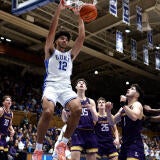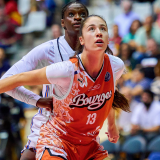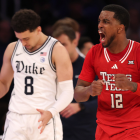As college basketball sets 2020 start date, plenty of questions remain that must be answered in time
Point A has been achieved, but now it's up to college basketball to get us to Point B

For several months now, ever since the COVID-19 pandemic abruptly caused the cancellation of the 2020 NCAA Tournament, the biggest question connected to college basketball has been this: When will next season start?
We got an answer Wednesday. It's Nov. 25.
So now there are only 50 million more questions to answer before things tipoff! And no, this is not me trying to take away from Wednesday's development.
To be clear, Wednesday was a good and significant day for college basketball. It gave us a date to circle. But what will happen on Nov. 25 very much remains to be determined. Even coaches at the top of the sport are mostly confused about any number of things.
Like ...
Are all teams actually going to start in November?
Is everybody really going to play nonconference games?
Will high-majors deal with low-majors at all given they likely won't test the same way?
Since some teams won't be able to play all of the nonconference games they've already scheduled, what will they do about some of the nonconference games they've already scheduled but can't play?
Will games happen on campuses or in bubbles or both?
I recently asked a coach some version of each of those questions.
His response to basically all of them? "I have no idea."
So, yeah, there's still a lot to work through. But this is undeniably a nice first step. Again, we finally have a date to circle on the calendar. It's Nov. 25. As for what will happen that day and in the weeks that follow? Man, who knows?
My assumption, based on various conversations with sources, is that even though the Division I council is recommending that all teams play four nonconference games, some leagues -- most notably the ACC -- might decide that playing conference-only schedules is the way to go. And some leagues, especially the ones with limited resources, could completely opt out of the season. Some teams will play 27 games. Some will play 17. Some might not even get to the 13 that the NCAA has determined will be necessary for schools to qualify for consideration for the NCAA Tournament. Some teams will play in front of fans. Others will not.
It's going to be a mix-match mess with little and (probably) big bumps along the way. Anybody suggesting otherwise is silly. But the good news is that, one way or another (barring a surprise), the 2020-21 college basketball season is going to start Nov. 25 and end with NCAA president Mark Emmert, presumably in a mask, handing a trophy to the coach of the team that wins the final game in early April.
The truth is that I didn't always believe such was a likely scenario. But I do now. And the people who are guiding the sport, most notably Dan Gavitt, the NCAA's senior vice president of basketball, deserve most of the credit. They are not making the mistake college football made -- which is to say, they're not sitting around and just hoping (with fingers crossed) that COVID-19 will magically disappear in advance of the Champions Classic. Instead, they're sensibly assuming it will not. So they're stacking contingency plans on top of contingency plans on top of contingency plans.
And that's smart.
Because the goal is simple: Start the season. Finish the season.
How we get from Point A to Point B is way less important than just getting from Point A to Point B by any means necessary. The decision-makers understand as much. We learned on Wednesday that Nov. 25 is Point A. And I feel comfortable speaking for all of us when I say it cannot get here soon enough.


















